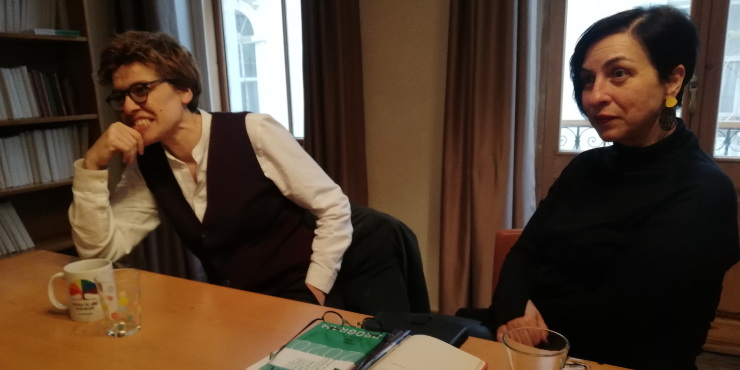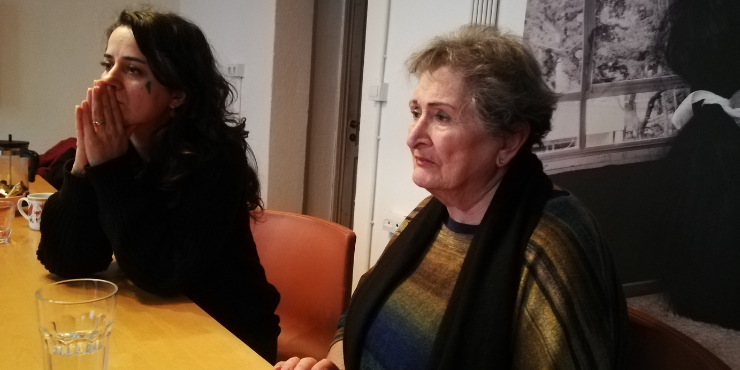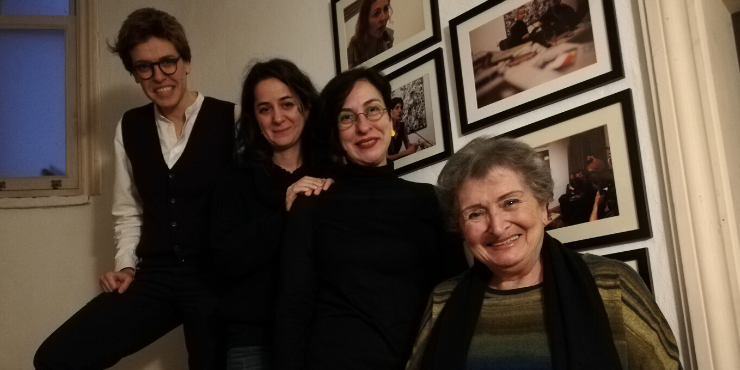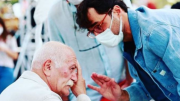AYŞEN GÜVEN
While the humanity all over the world is trying to resist an epidemic despite the governments, the theater players greeted March 27 (World Theater Day) this year with their doors closed, without laughter, without people and with silent stages. Of course, this atmosphere that seems so bittersweat now will lift, the curtains that have been opened for 2500 years will be reopened, the chairs will be filled again, but today’s theater has some dilemmas, arguments, problems, needs and moreover hopes that will continue when that day comes.
We met around a table with critic Seçkin Selvi, dramaturg Özlem Hemiş, theater player (Kumbaracı50) Gülhan Kadim and playwright Ebru Nihan Celkan about a month ago. So it was a day when we didn’t have to physically keep distance yet, we could hug. We talked about in which age is our theater, using “golden age of theatre” that is talked about a lot as an excuse. And we realized right away that first of all, we need to come together more to talk about theatre!
Even though our meeting was once in a blue moon, I left the room with the longest meeting transcript of my life and the titles of the new possible articles on theater. This is how the beginning of a series in which we will continue to meet with names from different disciplines in the theater was started. Now, we take you into our meeting room. Even though it seems dark at first, it seems like we will see everything in the room more clearly as we look at each other’s faces… In the end, it seems like we will be able to go on hopeful paths again with the truth, even if it is difficult. Happy World Theater Day, hope to see you on those stages again…
There has been a debate going on in the theater scene for a while, about ‘the golden age of theatre’ in Turkey. Without getting stuck to this discussion, I would like to take a wide-angle photo of the theater scene, what do you think?
Özlem Hemiş: Of course, but when such things are talked about, always my reflex to establish some historical connections come out. I think it would be good to deal with the subject considering a historical context. For example, when we talk about the “golden age in the theater in Turkey”, there is the Spanish Golden Age of the “Lope de Vega”s that is not widely read in Turkey. From the beginning of the XVI century to the middle of the XVII century… Lope de Vega says, “I can tell if something is good in the theater as follows: If the box office is good, the theater is good, if not, it is not.”
You’re going to England’s golden age, no one is watching free plays. Those who watch the play in Shakespeare’s famous Globe Theatre while standing and not sitting, they pay as much as the cheapest beer in pubs and go inside the hall. Look, the best formula to produce a theater that could run with its own resources is actually existing there. In this atmosphere, we see the ‘British Golden Age’ in the theatre.
Likewise, the same thing happens in Molière’s era right after. Look, we’re talking about the places where the theater spring from, by the way. There is a similar economy there. The theater is closed for only 40 days, other than that the stages are always open. The random closure of the theater only happens when they go to watch execution. We are talking about theaters that are constantly meeting with the public, generally with 60-70 percent occupancy rates. In Shakespeare’s time, there were theaters with a capacity of approximately 3000 people. This occupancy rate should be considered with the knowledge that London has a population of 300,000. According to sociologists, this is a very sufficient flow for the transformation of culture, and for me we are not living in such a golden age. If the latest research by Kadir Has University, claiming that only 73.6 percent of the population do not go to the theater, that could be acceptable. But I don’t think this percentage is true.

Seçkin Selvi: It’s not, of course.
Could this research be based on stages like Zorlu PSM, which are economically strong and have many physical opportunities? Could the situation be different in such big places with big halls and metro transportation?
Ö.H.: If it is not rumour; when foreigners first came to Turkey for Zorlu Performing Arts Center, they had a research conducted. And according to that research, the number of theatregoers in Istanbul does not reach 500 thousand. Even for an art venue of that size. See, the population of Istanbul is 18 million.
Ebru Nihan Celkan: It doesn’t even reach two percent.
S.S.: I think we can’t create citizens either, guys. There is migration to metropolises in all countries, but in our case it is the opposite of this. There, people who go to the metropolis are assimilated there. Here people coming to the city assimilate us. I would also like to reproach that theater signs are hung on every door while examining this golden age. Because quality and quantity began to change too. I have watched such plays, I see such plays, I read such plays that a chill runs down my spine. Baba Sahne started a play competition. We have 200 plays in our hands and we haven’t been able to say “that’s it!” until now. Is it possible that these people don’t have any idea on theater? For example, there are solo plays of single actors. They write their own life stories; all their lives are screenplays, novels anyway… I think they may not have gone to theater before. Now I will say this too; It was this unnecessary theatrical inflation that permitted to the golden age charlatanry. Right now, there are 300 plays on stage, how many of them are plays and how many are theaters? It’s not just the people opposing us, but also what is produced on this side who enabled this situation. We should talk about these too. They found a gap; they had money, they had opportunities. And they seeped in there.
Fashion of solo plays has the same story. Probably 30 years ago, Hülya Avşar, (a famous Turkish singer) took the stage with a solo play. Thank god she had to quit after the fourth play because no one went to watch. Now the solo plays of the “celebrities” are on the stage again. When one does, they all do the same. I’m so angry at that “celebrity” term! This word “celebrity” is also a result of the corruption that started with the dominant politics in the 1950s. You see, the theater companies bring the “celebrities” on the stage. They have become famous on television, considering “maybe they will bring me audience”. However what a fame is theirs! Some of these people are people who play in small skits and rough stuff. This style should not have been allowed so much.
Gülhan Kadim: Of course, solo play is an important and beautiful threshold. But before getting experienced on the way, before working as a team, solo play started to be considered like the easiest thing to do. The idea that anyone can do anything, the understanding that anything can be accepted, the feeling that even an average thing can be pampered, has become so distasteful.
“IF YOU LOOK AT JUST ONE PLACE, IT IS POSSIBLE FOR YOU TO SEE A GOLDEN AGE THERE”
As I listen to you, the same question is spinning around in my head; if there is no audience, there is no profit, why is some people still investing in theater?
Ö.H.: If you ask me this corresponds to another formula. This deduction of our friend, who uses the phrase “golden age” in theater and says that money is also made, is of course proclaimed by her own experience. She is has a long-term experience, also producer of plays written by a writer like Berkun Oya and his stage direction world. As far as I follow, she is now taking part in the production of Alice Musical with a leap. Naturally, this is her journey and according to her experience she gained there the box office may be full, be selling, and the actors may be earning well as well. But I don’t know if our friend is watching a play in the theater that is being staged apart from these. I think this is the only way, she could make such statements.
S.S.: On the other hand, maybe it’s really a golden age for theatre hall owners. Terrible prices are being said to the groups now. As you all know, prices that no one can pay, even in a hall where a normal audience would come, have been demanded. But on the other hand, there is the situation of these ‘under the counter’ theaters. When children go to the theater, people are looking for some conditions. I would like to go to a theater that has at least a toilet. You say “we do perform well”, yes, but sometimes you don’t do “theater”. Performing and masturbating should be a little different. I suppose it’s good for us to separate them.
Let’s listen to those who perform; which era is this period of yours?
Gülhan Kadim: I find it really interstingt how it can be perceived so differently. As a theater actress who has been in the business and has been in fluttering mode for months, I’m really trying to understand the reasons for this difference in understanding. Actually, I’m getting to a place similar to what you are saying; if you only look at one side, there is a great wealth; musical productions that were never made are being made; you see impeccable halls, a glittering, sparkling atmosphere. The box offices are full, and there is no seat left in the halls. If you just look there, it is possible to see a golden age. As someone who has been in this business for such a long time, my expectation which is maybe what most of us expect, is to be aware that the real wealth is not there. One side may really be on the rise, and I think it is… I think there was more demand for these productions last year. I don’t think it’s going that well for anyone this year. Yet somehow it is insisted that it is doing very well, I don’t know. However, it is obvious that whoever I talk to, including the managers of very large venues, does not earn the amount of money they had spent. Ours has turned into an effort to save costs and through which nothing can be earned. And that’s actually not a good thing at all, for anyone… A few productions may be very shining, seats may be totallty full; it may be making money, the actors may even be earning. But it is also true that there are things that are padded here. If such venues and productions will continue, as I hope they will; they are and will be contributing to all of us. Sure it should, but by seeing this side as well. Just as big productions have a different place in Europe and America, it may be the same here.
S.S.: Really. Then it is necessary to bring an understanding of Broadway.
G.K.: Maybe it’ll go that way. But I want to emphasize this point; while showing the difference between them, one should not fall into error that “it is not a real theater”. When it is done so, this time it is like saying “only we are doing the real thing”. What about them? No, it’s real too, and it’s nice that it exists as well. Also, no one alone has the monopoly on theatre. I think we shouldn’t discredit the other just because we don’t think the same.

IS TURKEY’S BROADWAY BEING CREATED?
This is an important point Gülhan. I want to continue this Broadway issue. We’ve talked to Ebru before, maybe she can bring them up here. Is it possible that a Broadway really is being created? What is always talked about in Turkey, cinema is a sector, but theater is not. I wonder if theater is becoming a sector too?
E.N.C.: First of all, I think that these discussion areas should be expanded. Because even us are only speak by focusing only on Istanbul. Even this alone is enough to make us rethink the expression of ‘the golden age of theatre’. We just started playing in other cities. For example, Gülhan’s thater company have been making theater for years, I don’t know how many cities you have been to, but I’m sure it’s not more than ten.
What does it mean?
E.N.C.: In fact, let’s stop and think. We haven’t been able to expand even the good performances to Turkey. Ms. Seçkin said a very nice thing about nationality-citizenship… First of all culture is a human right. In other words, I wonder how many people can use their rights right now! Are people aware of these rights? This is a huge question mark. Though theater creates meeting spaces; as Özlem just said, someone who wants to watch a play for the price of a beer in England, and someone from the House of Lords comes to watch that play in the same hall. I can never forget, it was one of the most important examples for me; Berfin (Zenderlioğlu), Mirza (Metin) and I wanted to make a play together. We were looking for a place. In my world, the place should be in Taksim, Beşiktaş, etc.. At that time, everyone is already on Istiklal Street. Mirza said: “Our audience can come here changing three vehicles.” I was so ashamed. I never thought of that. Until that day, I never thought about how many vehicles the audience should take to come to stage’s location. Moreover, they have to pay for the transportation and so on in addition to paying 100 Turkish Liras to the ticket. In other words, in order for me to call it the golden age, speaking for myself, theater must be spoken in the public sphere.
“WE CAN’T FIND THE COURAGE TO PERFORM ON THE STREETS, ANYWAY THEY DO NOT ALLOW IT”
Alternative/independent theaters have shaped our generation and the previous generation, and will undoubtedly shape future generations as well. As the audience, we have learned a lot about new, brave, lively, including the past and capturing the modern. Gülhan, for example, you staged a play called Downgrade Relics (Yokuş Aşağı Emanetler). The audience and the actors were walking around the streets of Istiklal throughout the play. How impressive was that! Can you imagine such a play staged on the street today? Can you still find that courage?
G.K.: We can’t find it, they won’t allow it anyway.
E.N.C.: I’m sorry I interrupted, but do you remember, performance artists put on a dance show on Istiklal Street saying “it’s nice to get dirty”. The female dancers danced rolling on the ground, passing each other. Their clothing were white. I can’t imagine that right now.
For example, there was the theater festival held by Galata Perform on the street. When thought of it, we didn’t call that period the golden age.
G.K.: We were living in that period, we thought it would be better if we named it later.
With reference to this, can we say that self-censorship works more?
E.N.C.: I certainly don’t want any of my colleagues to feel offended, but I think the self-censorship is widespread. When I look at what we call alternative, independent theater, from the time I first started doing it, I see this clearly. Anti-war plays, anti-conscription plays, plays against the conflicts in Turkey, yes, but I would like to add the question of how. “Has it changed?” “Has it diversified?” “Has it transformed?” as well… I’m sorry to say in quotation marks, but for example, something as a “women’s play” has come out. What does women’s play mean? This name began to be given when we saw a woman on stage. Well, is it so? We have become unable to talk about the things we really need to talk about. I’m saying these as a playwright, otherwise I would never want to annoy the authority. But self-censorship is such a devil! That’s why I need a second, third, fourth eye. Therefore, a dramaturg or a critic should tell me, “Ebru, you are self-censoring here.” Otherwise, it is very difficult for a person to understand this for herself. The feeling of being watched from everywhere and the question “what am I censoring?” are two of the biggest struggles I have been facing myself at the moment. I think other people have encountered this problem as well. Censorship has become more sneaky. We watched a play called Trace (İz). What did it tell about our recent history? And also Common Peretrator (Failimüşterek). An example of my own plays was Lemonade (Limonata). Çıplak Ayaklar Kumpanyası did something on the streets called Mehmet Loves Barış (Mehmet Barışı Seviyor). There was an enthusiasm about watching theater on the streets. What I want to do as a playwright is to create that enthusiasm in the audience. But when I self-censor, I cannot create it in myself, then how will I create it in the audience? That’s why the golden age damages me.
G.K.: I’m thinking very similar things. It was such a period that actually did not last very long, but when we look back, we are at a point where we can say how brave things we have done. This really hurts right now. Actually, we all feel the same. When asked if there is self-censorship, some say no, but this is not possible. Just as we apply it to ourselves in the street and in social life, we do the same thing in the cinema and in the theater. No one feels safe because they live with the fear that something may happen at any moment within an obscurity. So you start to protect yourself. We were very surprised in the first season when our stage was sealed because of the play Lick But Don’t Swallow (Yala Ama Yutma). I wouldn’t be surprised if something like that happens now. Anyway no one would ever think of making such a play. Let alone the courage, no one would even think about it. It’s really pathetic that we have such filters. Because not being able to do it or looking for a way to do it is one thing, not looking at it at all is another.
Ö.H.: Of course, with all these justified concerns, production cannot be made by thinking about from where we will be attacked. We encounter many examples of censorship in academia as well. For example, the students of my colleague, who was teaching the history of Turkish theater at a private university, reported to the rectorate, saying that the teacher is ‘anti-militarist’! It’s sad, after all, if we can’t trust our students in the class either! If we are not going to tell how the theater transformed after each coup while we are telling the history of the Turkish theater… So let’s not give that lesson anyway. Because the history of Turkey and the history of the theater overlap. This course cannot be taught otherwise.
So censorship begins in the education system, too!
GK: Unfortunately. Now that I think about it, this self-censorship works really well. We are so focused on doing our job and living in sheltered areas that we do not go out of those areas ourselves. I live in Kadıköy, in Beyoğlu I try not to go anywhere except the street of the theater. I started doingtheater from a place that did not mess with anywhere. This ‘let’s get closed up, closed up’ situation has really closed us up. Now I think about it as I talk to you. But here you come to the same place; your ticket price is determined, the audience is determined, you cannot sell it cheaper!
You play in Beyoğlu, Kadıköy, Zorlu, so you can’t put yourself at that much risk. Maybe, for example, if Nihayet Makamı is played in a further place, in a district, I don’t know, maybe in Sancaktepe. If it is staged in other districts where immigrants live or if we can meet the audience in different cities, we will gather strength or transform ourselves. Anyway, since long time I have a wish to contact that audience. But neither that audience can come to me, they can’t pay that money, nor can I go there. I am waiting for the municipalities to change hand and buy these plays so that we can go to that audience. So we can look at ourselves through a different eye. The situation becomes nonsensical, opportunities are lost. This has always been so, but we had hope for a while. When we said that we would move from here to another place, we arrived at the same dead ends.
“EVERYONE MAKES A ‘WOMEN’S PLAY’ BUT NO PLAY ABOUT MASCULINITY IS NOT MADE”
In fact, there was an incredible intellectual and physical solidarity between alternative/independent theatres. The ability to produce together. Maybe daring was also about creating collectively, I don’t know. There is a state of being dispersed in that medium. Please correct me if I am wrong. But it’s as if everyone has retired into their own shell or is burning in their own hell?
G.K.: It’s a little bit like that. The reason we took off at that time was partly because of that union. Whenever a new venue was to be opened, a support play was performed, and the income was given to that new stage. We were calling to each other’s plays and making their announcements. When someone had a problem, we came all together to solve it.
E.N.C.: I remember too, we had a map. Alternative venues map. We were walking in Istiklal saying “Should I watch Disco No. 5 in Şermola Performance? Should I watch Trigger (Tetikçi) on the İkinci Kat? Should I watch the Common Perpetrator (Faili Müşterek) in Kumbaracı50? Should I watch Trace at Galata Perform?” Imagine they are all performed at the same night. Gülhan was one of the first people to whom I sent the Prince from Space (Uzaydan Gelen Prens). She read it and turned to me and said, “My beautiful friend, this play doesn’t do.” I need her to tell me this. Because I know that I will go and work again. And she watched plays, and knows my scale. That’s why she can say it. At that time, so many topics were opened that my hope was there. Now it’s like spring had arrived. But also like a monophonic choir. Everyone is making a “women’s play”, but a play about masculinity is no longer made. We openned up the military service for discussion, we openned up the war for discussion. As a feminist writer, I say, “My friends, let’s discuss masculinity, write this, dig in here.” You see, it was hard to discuss back then, and it’s even harder now. That’s why I say in terms of content, there are thousands of types of self-censorship.
S.S.: We always see the same pattern. Either her father abused her or her uncle abused her. It’s the same on TV. There are no legitimate children. All happened as a result of rape or betrayal. Such templates were created. I’m looking at plays, and I see the same thing. There is no difference, no diversity.
G.K.: I think we could not convey the wealth of that period well. Here, everyone can get their share. Because it turned into situation in which plays started to be written with a number of formulas, trying to imitate each other, trying to do whatever audience liked. Now something happens when an immigrant story is established. There is this, there is that, and when you mention about this. They use formulas such as money can be found, for staging. It’s a bad thing that this is working on our side as well. We are now in a period when we need such an explosion again. But there are plays that are similar to each other and that are not alternatives at all. What we call alternative seemed to be about transforming the venue. Most venues started like that and all of a sudden the venues started to fix their seats. This is also an indicator. I’ve been saying we’re retarded for ten years now, because we continue to make theater in a place with a heavy workload. But if you continue to make theater in such a venue, transforming the watching actually provides a wealth. Of course, you can also transform the audience every time.
S.S.: I am looking for alternativeness in the theme in theater, I don’t care about the venue.
Ö.H.: I think Kumbaracı50 is a real stage alternative. Because it has its own language. If you have been able to create that language, you are an alternative. Otherwise, calling a venue alternative does not make you permanent.
E.C.N.: Even an ossified stage like DOT, which always had an audience, was closed. The closing of a theater that has had a venue for 15 years without even saying “I’m closing the venue” made us all think.
G.K.: For example, when I heard that they closed the İkinci Kat, I was very affected. They decided to do it secretly, without even announcing it. It’s completely closed, none of us know about it. I didn’t even ask for the reason.
G.K.: We live so much in between. Now, as a person living in a civilized, social, etc. city, I know the needs of theater. There are lots of budget lines like safety, quality. But now, with an occupational safety law, they can actually close all these places. Or such fines are imposed that they don’t have to close them. It’s a power they have. When we go there, they say, you do it like this, I can’t give you a license, but we will overlook it anyway. Of course, we think about how it would be if there was an earthquake. However, it hurts so much that; you want to do, you can’t. Now in that occupational safety, it is said that all fabrics will be fireproof. How can I buy fireproof fabric? The price is three times more than the other. It’s not that I don’t know or that I don’t want to.
They’re suspending your allowances, but they are also asking for fireproof fabric.
G.K.: And no one will support you to buy that fabric. So how will we do? A new problem with independent theaters is appearing. It’s an inextricable thing. Maybe it can turn into something we can get through by standing together. Or we, together with the Theater Cooperative, can use our strength and say, “Look, there are such theaters, you have to see them and change. Now, we are thinking of saying that at least you need to provide some support to make it suitable for the era.” We hope that this will be one of the biggest gains of the Cooperative. Maybe if there is a recuperation and reunification.
E.N.C.: I care about the word ‘cooperative’. We don’t have a space to think about different models right now, a space to come together. It does not matter whether it is governmental, subsidized, independent, alternative. For example, Gorky is the theater of the people of Berlin. It is supported by the state, but it is the theater of the people. That’s why there is so much diversity. Because the people say, “There is a big Turkish population here, if you don’t perform a half-Turkish play on the stage, I won’t come.” This way, its language and repertoire diversify. There are so many models in the world that we should be able to look at them now.
Gülhan is one of the theater actors I have seen the most in three dimensions. I realize now that we haven’t had a conversation like this in a long time. Where and when will we reach a new idea, a new thought, a new perspective, a new point of view, a new language, while we do not even do this? There is a saying that I love very much in English, but I will try to translate it into Turkish “too much noise, too little progress”, and I cannot name what that progress is. But at this table, we all saw that we all need organization, unity, discussions and coming together more than before.
Since the beginning of the conversation, I have always had the ‘entertainment theatre’ in mind when you said ‘paid productions’. There is also a perception like this, don’t you do humorous and entertaining works?
S.S.: Commercial theatre.
Yes, let’s say so. As if you have done surly and unenjoyable work until today?
G.K.: No, of course not like that.
E.N.C.: Of course not. We have also done pretty entertaining stuff.
How can they not make humor while they are called independent theaters, that have the promise “opposition” the most? Özlem, what do you think?
Ö.H.: It is necessary to make a diagnosis here, you are right. If you look within our tradition, Metin (And) Brother, thank him, worked on condolences, but he is not a core asset of the dominant culture in Turkey, you know. Apart from condolences, everything in the tradition is related to laughter. However, when you look at it together with this, there is an authoritarian central structure. That central structure cannot control everything, there is a mess. Where the traditional elements we find about the theater are in the center. And they all have comedy elements. It always breathes with laughter.
S.S.: Let’s say humor. Because humor is the best way to make opposition.
Ö.H.: Yes. Thus actually tradition contains this. Again, the fiction of the dramatic conflict in the classical drama or the fiction that follows the tragic vein, we have only as much as the tragic vein. Look, there is no tragedy. For this, you need to have established a set of values that will conflict with each other. For example, consider the confrontation of state and religion in Antigone. Go to tradition, you cannot conflict religion with the state. The state has already defined itself as the bearer of that religion. The Ottomans also based their genealogy on Noah. Now that conflict somewhere from here; there was no chance of writing something in which community and individuality could be confronted. Anonymous texts anyway. Being anonymous is an issue in itself. While there is such a past, we say that we will produce drama in the western style. It doesn’t suddenly become something you can become skilled. For these reasons, it is important to find your own language. He or the other, the dialogue form of speech against speech, in a sense, is a solution, a remedy dialogue form that people produce against loneliness in death, a place against death. We come from all this, we try to do something in a culture that does not affirm conflict. Indeed, that’s why the thing that excites me the most on stage; encountering a new language, a unique sound. Yes, the content is also important, but if you’re after that language and don’t do it with plastic intent, the content and form combine so well and ferment that you’re watching something really good there.
S.S.: After all, doing something alternative is not doing something better than ‘a theatre’. To do something different. We live in such an oppressive order that individuality is crushed because of it. This time, the effort to create oneself comes to the fore. But it should not be taken the easy way out because of this. Guys, sometimes I can’t understand the Turkish language of those who say “I am more alternative”. It shouldn’t be that much.
E.N.C.: That’s exactly why I think there’s a need for a lot of critics. It is not that much as a number however, he will write about what he sees on stage, keeping his distance with all his realism, with a theatrical perspective. When we read what is written, it will enable us to do our homework and improve ourselves.
CRITICAL: “A THORNY METHOD”
Indeed, culture-arts journalism and critical writing is another injury. Anyway there’s no place left. The rest want to be ‘praised’. You are right, it has become difficult to feed on. But has criticism done its part in all the discussions?
S.S.: It’s called constructive criticism. For example, I have never been able to make constructive criticism.
Ö.H.: You are right, we should talk about that too. In fact, we should be able to see and show the difference between the industrialized and the non-industrialized. The criticism is to blame a little there. Let me say this including myself. We had to write these, we didn’t write enough. However, even the critic of industrial theater and the theater we can call arthouse are different.
So, we should talk about the perspective of the media towards criticism. We have seen examples in which people called and swore on the phone before you even have the article in your hands or seeing the printed version, or in which all the criticisms are removed with tweezers by the editor-in-chief. Since there are many people, who think that I wrote the criticism only to praise themselves as my critical review which is left with only praise, try to frame and hang it on their wall, people give up writing very quickly. It’s a very thorny media.
S.S.: Criticism must have an effective force. While I was writing in Sabah Newspaper -in the old Sabah-I wanted my articles to be published when I sent them. Do you know what answer I got? “It is determined by advertisements,” they said. The fact that saving is primarily made here is also related to the lack of demand, unfortunately. That’s why I say we can’t create citizens.





